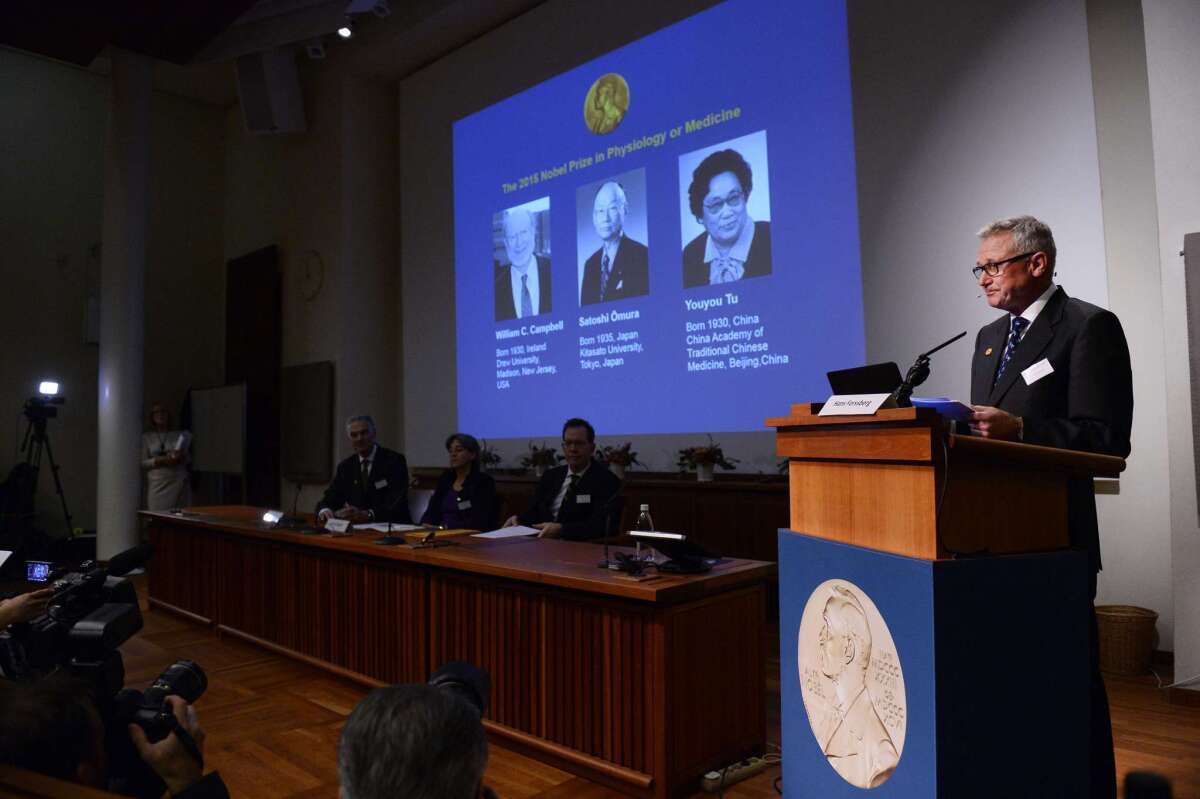Nobel Prize in medicine goes to 3 scientists for work on parasite-fighting therapies

Hans Forssberg, member of the Nobel Assembly, announces the winners of the Nobel Prize in medicine at the Karolinska Institute in Stockholm on Oct. 5.
- Share via
Three scientists whose discoveries have driven scourges of the developing world to the brink of eradication have been awarded the Nobel Prize for physiology and medicine.
The Nobel Committee announced Monday it had awarded the 2015 prize to 85-year old William C. Campbell, 80-year-old Satoshi Omura and 85-year-old Youyou Tu for their discoveries leading to the development of antimicrobial treatments for such tropical diseases as river blindness, lymphatic filariasis (also known as elephantiasis) and malaria.
Campbell, an Irish biochemist and parasitologist at Drew University in New Jersey, and Omura, a bioorganic chemist at Kitasato University in Japan and Wesleyan University in Connecticut, will share half the prize for their discovery of the compounds avermectin/ivermectin.
NEWSLETTER: Get the day’s top headlines from Times Editor Davan Maharaj >>
In Japan, Omura explored the antibacterial properties of agents produced by the naturally occurring Streptomyces microorganism, which lives in common soil. Campbell, an expert in parasite biology working in New Jersey, acquired Omura’s cultures and conducted extensive tests of them in farm and domestic animals.
Among the most efficient killers of parasites, he discovered, was a purified version of Avermectin. Chemically modified to produce Ivermectin, the result was found to kill parasites in their larval stage, which made it powerful medicine.
Ivermectin’s global impact on human health is often compared to that of penicillin. It is used around the world to treat diseases caused by roundworm parasites, including river blindness and elephantiasis. It continues to be administered to some 300 million people who use the compound annually.
The committee awarded the other half of the prize to Tu, whose work for the Chinese government resulted in the discovery and development of Artemisinin, a treatment for malaria.
Drawn from the extract of fever-reducing plants long used in traditional medicines, Artemisinin continues to be the primary drug used in the treatment of malaria. Annually, some 400 million doses of the drug are administered.
As head of Chinese Government’s Project 523 in the 1960s, Tu and her colleagues isolated the active ingredient that protected against the malaria parasite and developed an extraction method that allowed its therapeutic use.
After finding the extract effective in mice and monkeys, Tu and her team tested the early form of Artemisinin on themselves to establish its safety in humans.
The Chinese government team’s discovery came at a crucial time in the fight against malaria, a disease that plagued mankind since the dawn of history. By the late 1960s, the agent long used to treat malaria -- chloroquine, or quinine — was diminishing in effectiveness, and efforts to eradicate the disease throughout the developing world had faltered.
Tu was awarded the Lasker Award in 2011 and the Warren Alpert Award in 2015 for her work on Artemisinin.
“When it comes to translation of scientific discovery, this is one of the greatest examples of the century,” said Dyann Wirth, chair of the Department of Immunology and Infectious Diseases at the Harvard T.H. Chan School of Public Health and a member of the Alpert Foundation’s scientific advisory prize committee.
“This is classic basic research that has resulted in a drug that saves lives.”
In announcing the award, the Nobel Committee hailed the influence of the researchers’ discoveries on global health, noting that diseases treated by their discoveries have been pushed to the brink of eradication.
“These two discoveries have provided humankind with powerful new means to combat these debilitating diseases that affect hundreds of millions of people annually,” the Nobel Committee declared in announcing its 2015 awards on Monday morning. “The consequences in terms of improved human health and reduced suffering are immeasurable.”
The medicine award was the first Nobel Prize to be announced. The winners of the physics, chemistry and peace prizes are set to be announced later this week. The economics prize is to be announced next Monday. No date has been set yet for the literature prize, but it is expected to be announced Thursday.
For more medical research news, “like” Los Angeles Times Science & Health on Facebook
ALSO
Brown signs bills on human trafficking, elephant ivory, butterflies and DNA collection
Doctors Without Borders closes Afghan hospital, says U.S. may have committed war crime
Pet micro pigs? Chinese biotech firm says it will sell very small swine







